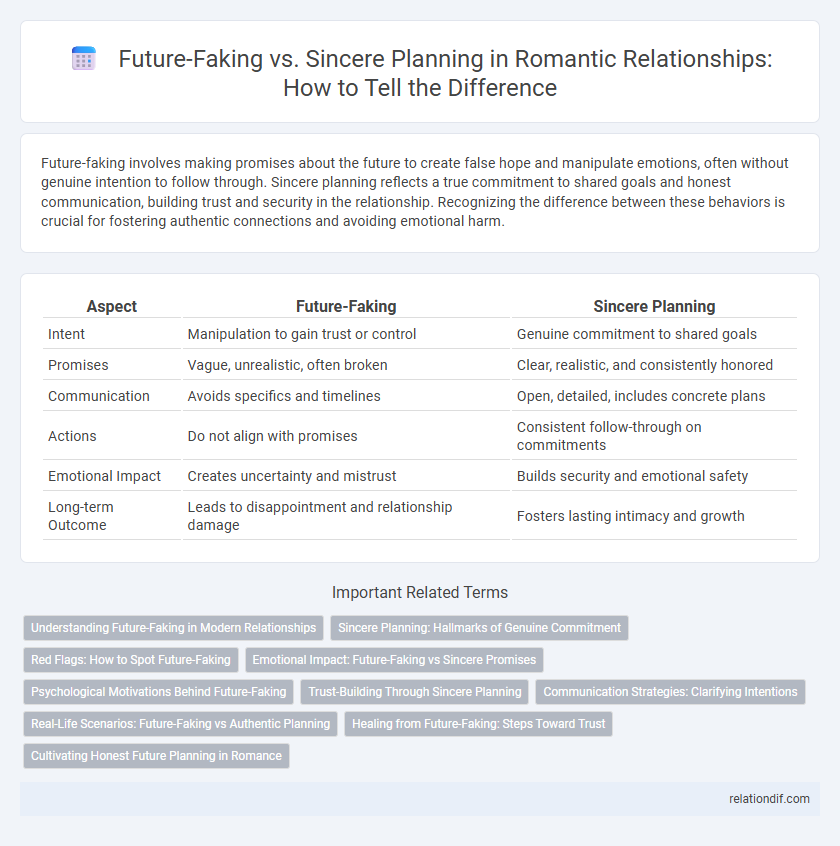Future-faking involves making promises about the future to create false hope and manipulate emotions, often without genuine intention to follow through. Sincere planning reflects a true commitment to shared goals and honest communication, building trust and security in the relationship. Recognizing the difference between these behaviors is crucial for fostering authentic connections and avoiding emotional harm.
Table of Comparison
| Aspect | Future-Faking | Sincere Planning |
|---|---|---|
| Intent | Manipulation to gain trust or control | Genuine commitment to shared goals |
| Promises | Vague, unrealistic, often broken | Clear, realistic, and consistently honored |
| Communication | Avoids specifics and timelines | Open, detailed, includes concrete plans |
| Actions | Do not align with promises | Consistent follow-through on commitments |
| Emotional Impact | Creates uncertainty and mistrust | Builds security and emotional safety |
| Long-term Outcome | Leads to disappointment and relationship damage | Fosters lasting intimacy and growth |
Understanding Future-Faking in Modern Relationships
Future-faking in modern relationships often involves making grand promises about the future without genuine intent, creating emotional manipulation and uncertainty. Unlike sincere planning, which is grounded in transparent communication and achievable goals, future-faking exploits hopes to maintain control or mask deeper issues. Recognizing patterns of inconsistent commitment and vague timelines helps individuals differentiate between authentic intentions and deceptive tactics in romantic partnerships.
Sincere Planning: Hallmarks of Genuine Commitment
Sincere planning in romance reflects genuine commitment through consistent actions, clear communication, and realistic goal-setting that align with both partners' values and desires. This approach fosters trust and emotional security, distinguishing true intentions from future-faking tactics that rely on empty promises with no follow-through. Authentic relationship planning prioritizes mutual fulfillment and long-term growth, creating a foundation for lasting love.
Red Flags: How to Spot Future-Faking
Future-faking often involves vague promises about a shared future without concrete plans or timelines, signaling potential emotional manipulation. Sincere planning includes clear, actionable steps and mutual agreement, reflecting genuine commitment. Red flags include inconsistent follow-through, reluctance to discuss details, and an emphasis on idealized scenarios rather than reality-based goals.
Emotional Impact: Future-Faking vs Sincere Promises
Future-faking creates emotional turmoil by instilling false hope and deepening feelings of disappointment when empty promises remain unfulfilled. Sincere planning fosters trust and security, allowing partners to build genuine anticipation and emotional connection through realistic commitments. The emotional impact hinges on authenticity, where future-faking breeds anxiety and skepticism, whereas sincere promises nurture relationship stability and emotional well-being.
Psychological Motivations Behind Future-Faking
Future-faking often stems from a psychological need to maintain control and manipulate emotional responses, providing victims with false hope to sustain the relationship. This behavior contrasts with sincere planning, which is driven by genuine commitment and long-term emotional investment. Understanding these motivations helps reveal patterns of avoidance, insecurity, or narcissistic tendencies behind future-faking in romantic contexts.
Trust-Building Through Sincere Planning
Future-faking often undermines trust in romantic relationships by creating false hope and unmet expectations, while sincere planning fosters genuine connection through transparency and reliability. Trust-building hinges on consistent actions that reflect honest intentions, demonstrating commitment to shared goals and mutual growth. Prioritizing clear communication and realistic plans strengthens emotional security, reinforcing the foundation for lasting intimacy.
Communication Strategies: Clarifying Intentions
Effective communication strategies for clarifying intentions distinguish future-faking from sincere planning through transparent dialogue and consistent follow-through. Expressing specific, realistic timelines and setting mutual expectations nurture trust and reduce ambiguity in romantic relationships. Prioritizing openness helps partners discern genuine commitment from misleading promises, fostering emotional security.
Real-Life Scenarios: Future-Faking vs Authentic Planning
Future-faking often appears as vague promises about a shared life without concrete actions, leaving partners uncertain and emotionally vulnerable. Authentic planning includes specific conversations about goals, timelines, and mutual commitments that build trust and clarity in the relationship. Real-life scenarios reveal that sincerity in planning fosters stability, while future-faking frequently results in disappointment and fractured connections.
Healing from Future-Faking: Steps Toward Trust
Healing from future-faking in romantic relationships involves recognizing the difference between promises made to manipulate and genuine, actionable plans for the future. Building trust requires clear communication, consistent follow-through on commitments, and setting realistic expectations based on mutual respect. Emotional recovery is fostered by prioritizing transparency and holding partners accountable to their words and actions.
Cultivating Honest Future Planning in Romance
Cultivating honest future planning in romance requires transparent communication about mutual goals and realistic expectations. Partners who engage in sincere planning build trust by aligning their visions and demonstrating commitment through consistent actions. Establishing clear intentions prevents future-faking, fostering a solid foundation for lasting intimacy and emotional security.
future-faking vs sincere planning Infographic

 relationdif.com
relationdif.com